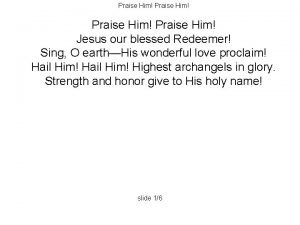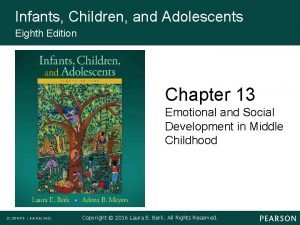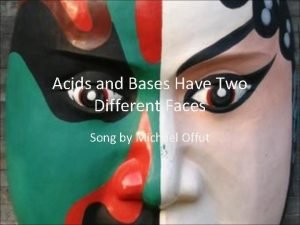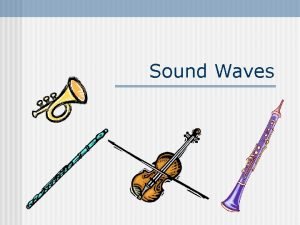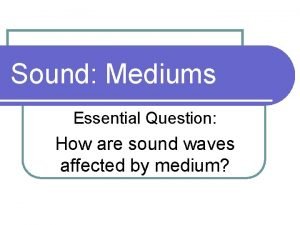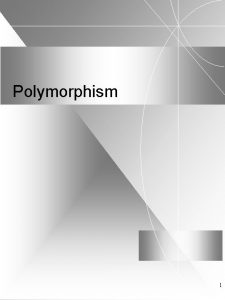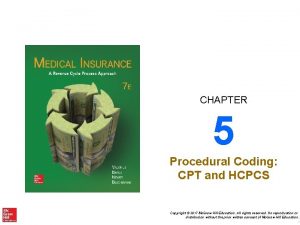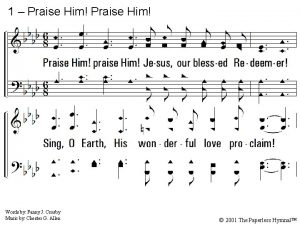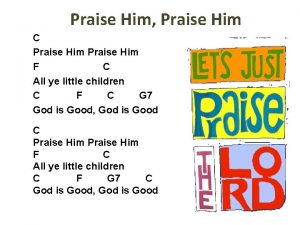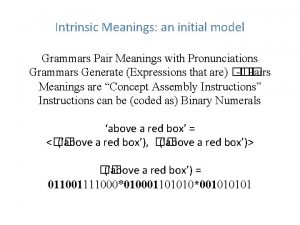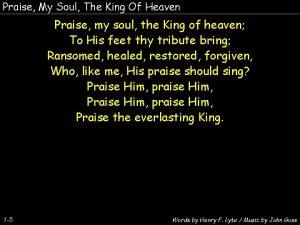DIFFERENT MEANINGS OF PRAISE We want to praise

























- Slides: 25

DIFFERENT MEANINGS OF PRAISE

• We want to praise and praise accurately. To help us understand what this is about, we will look into some of the Hebrew words translated as praise.

• BARACH (Bar Rach) - To kneel, to bless, to adore with bended knee. When used by man in reference to God, it means to endure with power for success, prosperity and long life.

• In Psalm 34: 2, barach is translated as BLESS and in Psalm 103: 1 -2, barach is translated to mean WORSHIP.

• HALAL (Hah Lahl) - The root is to shout, cry aloud. See Psalm 148: 1 -5, Isaiah 62: 9, Psalm 135: 1 -3 a. Try substituting "shout" for "praise" in these passages. The sense is to shout for joy, to rejoice, to be sincerely and deeply thankful.

• TEHILLAH (The Hi Lah) This word for praise is also translated as "Psalm. " David uses this word in Psalms 48: 11, 34: 2 and 100: 4. The noun is a song of thanksgiving.

• The theme of both noun and verb is verbal expression, an interweaving of belief and joy.

• GADAL (Gah Dahl) - Often translated "magnify, " it is used as a synonym of praise. In Psalms 34: 4 and 69: 31, it literally means "to cause to become great. " Gadal calls the worshipper to ascribe greatness to the Lord and His name.

• ZAMAR (Zah Mar)- To make music to God. Remember the word "tehillah? " It is very similar meaning a Psalm. A Psalm may be instrumental or vocal. Zamar indicates instrumental accompaniment.

• A zimra is a song or music. The Sabbath book of table songs, still in use today, is called zimarot, the plural for zimra.

• SHIR (Sheer) - Meaning a song, more specifically, vocal music. The term combined with others to indicate a choral group. Shir and zamar are used alternately in Psalms 21: 4, 104: 33, 57: 8, 27: 6, 13: 6 and 33: 2.

• SHAVACH (Shav Ach) - To commend, to congratulate, to laud. This word parallels some of the words we have already looked at. Refer to Psalms 63: 4, 117: 1, 147: 12 and 145: 4. The idea of parallelism is often used in Hebrew poetry.

• This occurs when the same information or idea is stated in more than one way, one verse reinforcing the other.

• RUM (Room) - The basic meaning is height and it is used to parallel many of the preceding words. Rum is used symbolically to express such lofty notions as glory, exaltation and to extol.

• See Psalms 30: 2, 66: 17, 149: 6. We can also see the following parallels: rum to halal in Psalm 107: 32; rum to barach in Psalm 145: 1 and rum to gadal in Psalm 34: 4.

• RANAN (Rah Nahn) - To cry out, shout for joy or to give a ringing cry. It parallels joy, rejoicing, praise and jubilation in poetry. Found in Psalms 5: 12, 67: 5, 90: 14 and 92: 5, the usage indicates that the highest mood of the Hebrew religion is joy.

• YADAH (Yah Dah) - The literal root is to throw or to cast. When used in text, it means to confess or declare Who God is and what He does.

• See Psalms 105: 1, 106: 1 for public confession of God's attributes. When yadah is used in the context of praise, it means to confess or declare the attributes of God.

• When yadah is used in the context of prayer, it still retains the root meaning of confession. Instead of the confession of God's attributes, it becomes the confession of our sins to God.

• Yadah has a two-fold meaning: the confession of God's attributes and the confession of our shortcoming or sins. Judah comes from the root, yadah.

• For us to let Judah go up first is to recognize that our battles are spiritual and must be fought in the spirit. When we let Judah go up first, we confess the attributes of God (yadah-praise), we realize Who and What God is.

• This brings us to realize and confess our own inadequacies (yadah-prayer). We confess our sins, our need for repentance and reconciliation.

• This allows us to establish a proper relationship with God. This very idea is implied in the "disciples prayer. " When we enter into spiritual warfare - "Let Judah Go Up First!" Begin to praise God by faith, confess Who He is, confess who you are, confess your sins and be reconciled.

• Continue by confessing forgiveness, confess God's mercy, confess God's love and confess God's victory! Kneel, cry aloud, magnify the Lord, sing, exalt, shout, and give thanks.

• After this, begin to confess God's Word concerning the situation. Then and only then, are you ready to go into battle.
 More more more i want more more more more we praise you
More more more i want more more more more we praise you More more more i want more more more more we praise you
More more more i want more more more more we praise you 齐来赞美
齐来赞美 Praise him praise him jesus our blessed redeemer
Praise him praise him jesus our blessed redeemer To god be the glory
To god be the glory Praise the lord oh my soul
Praise the lord oh my soul Praise him praise him jesus our blessed redeemer lyrics
Praise him praise him jesus our blessed redeemer lyrics Person praise vs process praise
Person praise vs process praise The gallaudet and clerc story
The gallaudet and clerc story Types of praise
Types of praise Cultural relarivism
Cultural relarivism Argumenterande tal struktur
Argumenterande tal struktur Technicolor test
Technicolor test Acids and bases song lyrics
Acids and bases song lyrics Sound will travel at different speeds in different mediums.
Sound will travel at different speeds in different mediums. Manufactured boards examples
Manufactured boards examples Examples of a medium in waves
Examples of a medium in waves Different people different things
Different people different things Thermosoftening plastics examples
Thermosoftening plastics examples Different angle different story
Different angle different story Voidpet symbol meanings
Voidpet symbol meanings Rorschach test meanings
Rorschach test meanings Os map symbols meanings
Os map symbols meanings Present tenses future meanings
Present tenses future meanings Symbols in literature definition
Symbols in literature definition Cpt symbols and meanings
Cpt symbols and meanings



